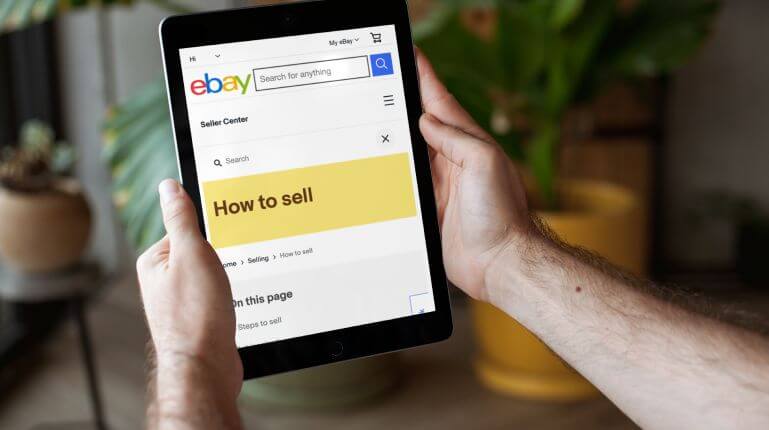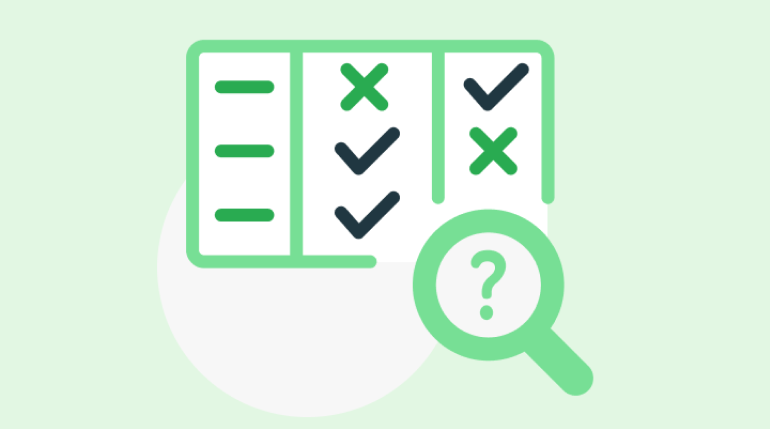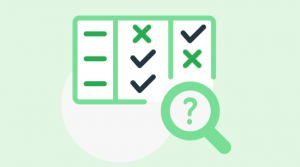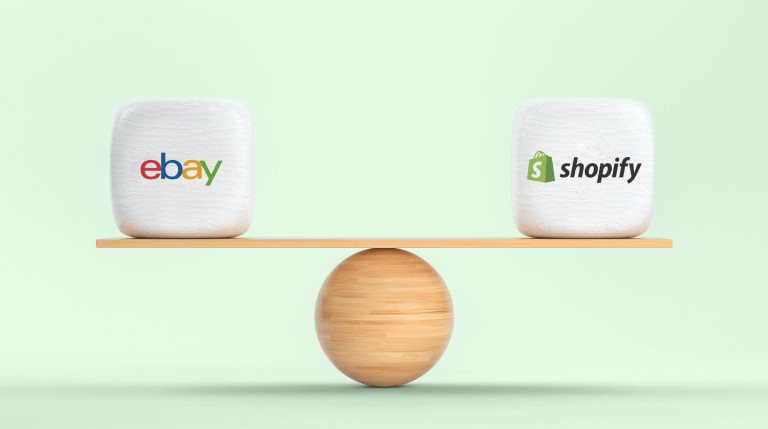One of the first steps to take when starting an eCommerce business, is choosing the right platform to host your store.
There are plenty of options to choose from, but you should research it as much as possible, before making a decision.
In this article, we’ll compare two popular choices – Shopify and eBay. While both are great options for online stores, there are significant differences any business owner should know.
This article will provide you with an in-depth comparison of Shopify vs. eBay. From basic introduction and setup to pricing, fees, customer support, and everything essential for picking the right eCommerce platform for your online store.
Here’s what you’ll learn:
- What Is Shopify and How Does It Work?
- What Is eBay and How Does It Work?
- Shopify vs. eBay – In-Depth
Shopify – an Overview

Shopify is an eCommerce platform where merchants can set up, manage, and grow their online stores. It’s a subscription-based system where anyone paying a monthly service fee can run a business and sell their goods.
It is a cloud-based command center for merchants, helping them handle daily eCommerce transactions and activities, like communication with customers, payments, shipping, inventory, and more, all from one place – their account.
Merchants can run their online or brick-and-mortar shops from any location and device, including mobile, web, social media, online marketplaces, or even pop-up stores. Inventory and stock get synced from physical and digital stores, providing easy store management and flexibility.
Shopify store owners have access to various eCommerce tools and features for smooth and easy selling. Third-party apps and integrations will fill all the missing blanks each merchant finds necessary.
eBay – an Overview


eBay is an online marketplace where anyone can set up an account for free and enter the world of sales. Unlike Shopify, eBay is mainly visited to find a much better deal on goods than conventional retail offers. However, eBay is most famous for its hosted auctions and product scope.
It is one of the oldest eCommerce platforms and the first online auction platform with the option to use it as both seller and buyer. If you want to list products up for sale, you need to create a seller account and add listings to your own eBay store, including product title, description, price, and picture.
eBay allows sellers to set up auctions where the highest bidder wins the product or add the Buy It Now option for immediate sales. Aside from auctions, eBay is most famous for its vast product scope. Merchants can sell anything from used goods to car parts and jewelry. As long as it fits their policy, you can sell it.
Make It Happen Today!
Shopify vs. eBay – In-Depth


Let’s take a closer look at the features and operations both eCommerce platforms offer, so you can decide on which to choose for your online store.
Shopify vs. eBay: Which Is More Beginner-Friendly?
Shopify: Ease of Use
You don’t need to be a tech-savvy professional to run your own Shopify store. Shopify comes with a built-in store structure with multiple templates, available for customization and adjustments, saving you the trouble of building a shop from scratch. Shopify also allows you to create custom solutions if you don’t want to use their builder.
While the store won’t be up and running in only a few clicks, the Shopify interface is clear and straightforward, even for beginners. The built-in tools and features make the starting process a breeze, allowing even the newcomers to enjoy getting started.
eBay: Ease of Use
Getting started on eBay is easy. Sign up with your email address, create a seller account, and, technically, you’re good to go. While some people sell only separate items, serious merchants opt for something more than just a seller status – they open an eBay store.
Subscribing to eBay Store provides multiple benefits for your online business. From discounts on fees to a more extensive inventory, more monthly listings, and valuable tools and features. The straightforward setup is beginner-friendly and requires no prior knowledge in this field.
Verdict. While both platforms are beginner-friendly, eBay takes the lead regarding ease of use. Getting started with eBay is simple, easy, and fast.
Shopify vs. eBay Store: Which One Is Cheaper?
Shopify comes with a free 14-day trial. After that, it’s up to the merchant to decide how serious the store will be.
- Shopify Lite. $9/month, sell in person, or add a Buy button to your website. However, you can't build an online store with this plan.
- Basic. $29/month, the Basic Shopify plan is perfect for newcomers with occasional in-person sales.
- Shopify. $79/month, this plan is for growing businesses that sell online and in person.
- Advanced. $299/month, the advanced Shopify plan will provide exclusive data reports and benefits.
- Shopify Plus. $2,000/month, for serious enterprise solutions and large-scale businesses.
eBay offers five different subscription plans to choose from.
- Starter Store. $4.95/month, for beginners with a variety of products who want to promote their brand and business.
- Basic Store. $21.95/month, this plan is for merchants starting out who want discounts on fees, coupons, and more.
- Premium Store. $59.95/month, this plan provides zero insertion fee listings for merchants with an extensive product scope.
- Anchor Store. $299.95/month, for large-scale merchants who need extra customer support and benefits.
- Enterprise Store. $2,999.95/month, for business sellers with an extensive product scope and excessive need for customer support, help, and benefits.
Verdict. When it comes to Shopify vs. eBay pricing, Shopify takes the win. Although eBay offers multiple subscriptions for sellers, Shopify plans come with better features and tools to grow your eCommerce business.
Shopify vs. eBay Fees
| Shopify | eBay |
|---|---|
Use Shopify Payments to avoid transaction fees and run your business smoothly. |
|
| Shopify |
|---|
Use Shopify Payments to avoid transaction fees and run your business smoothly. |
| eBay |
|
Verdict. Shopify takes the win in regards to payments and fees. It supports more than 100 different payment options and only succumbs to merchants with transaction fees which can be avoided with Shopify Payments, while eBay has many other fees.
Shopify vs. eBay: What Are Your Design Options?
First impressions are everything, especially in online selling. You have to wow the customers to keep them browsing. The store design is your key to success. Customizations, splashes of design, and personality differentiate your store from the competition.
Shopify: Designs
The Shopify theme store provides over 70 custom-made templates for your online store. Customize your store page to match your style, brand, or vision, and allow customers to enjoy shopping on desktops, tablets, and mobile devices.
Browse the template vault and customize your store to your liking and perfection. Modifications are possible on every detail within the template, allowing you to create the perfect store page for local and global retail sales.
eBay: Designs
eBay stores are not so flexible regarding store customization. An official eBay store comes with a standard template, allowing sellers to change only the logo, description, banner, and photo.
When it comes to listings on your eBay account, you can customize the product title, color, size, and description.
Verdict. If store design isn’t something you care about, simplicity is definitely on the list of eBay advantages. However, for a small business just getting started or a seller who wants to look different, serious, and professional, Shopify offers flexibility and options with built-in templates.
Shopify vs. eBay: Marketing and SEO
Shopify: Marketing and SEO
It’s important to remember, that using Shopify means you’re going to be running a website. Promoting it and driving traffic, is your responsibility and it takes time.
Shopify email campaigns and content marketing gives you freedom in spreading brand awareness and promoting products, deals, and your Shopify store. Boost traffic with your blog, while Shopify Email allows sending 10,000 messages per month for free ad campaigns, promotional updates, and more.
Another great marketing feature is social media integrations. Shopify offers integrations with all the big social media platforms, such as Instagram, Facebook, Twitter, and more. Promote your store with targeted ads and tags.
Regarding SEO, Shopify comes with many SEO tools, such as meta titles and descriptions, tags, 301 redirects, custom URLs, canonical tags, image optimization, and more. All those features will help your store page appear on top of the search competition.
eBay: Marketing and SEO
eBay is an online marketplace, which comes with its own internal search engine.
Other than that, eBay offers limited social media integrations on Facebook, Twitter, and Pinterest. However, the integration buttons mean you can share your products immediately.
eBay is strict and not as flexible as Shopify in email marketing. While eBay Store subscribers can send customers newsletters via email, the templates don’t have much customization space. It also keeps a strict eye on what to include in the messages, not giving you full creative control over the content you provide.
Furthermore, building your customer list for email promotions might be tricky on eBay. And some might say, not worth the bother. eBay doesn’t provide merchants with newsletter metrics, making them work blind when coming up with promotional messages.
As for SEO, eBay runs its own game. eBay’s popularity provides a serious amount of traffic. While regular SEO features are available, such as keywords in titles, descriptions, image alt tags, headings, and more. But that’s pretty much it. eBay doesn’t offer a vast set of tools to guide you through the SEO rankings.
Verdict. Shopify is the winning eCommerce platform for helping you boost your online business with SEO and marketing tools. The multiple features allow you to optimize your SEO and rank higher among competitors, while email and content marketing options attract customers and spread brand awareness.
Shopify vs. eBay: eCommerce Tools and Features
Shopify merchants have access to such features:
- Inventory Management. Shopify automatically tracks products and inventory status and keeps your stock up-to-date.
- Shopify Shipping. Shopify provides shipping labels, third-party shipping rates, shipment tracking data, shipping costs, and more.
- Slogan Maker. Come up with slogans for your ad campaigns and banners by typing in the store name, keywords, or niche. Browse the list of options and pick the right one for your website.
- Burst. This seller tool provides new and trendy stock images to add to your product displays. Use them in your listings, ads, and marketing campaigns.
- Image Resizer. Resizing images is essential for a unified look and optimization on all devices. Choose from compact to large, depending on your needs and store performance.
- Analytics. Shopify store owners have access to Google Analytics data and analysis on current trends, performances, and valuable insights into competitors and current demand.
- Business Name Generator. By simply adding some keywords, this feature will help you come up with a clever and catchy name for your store.
- Finance Calculators. Shopify provides sellers with finance calculators for better store management. From calculating ad campaign costs to profit margins, Shopify does it all.
- Shopify App. Manage your business account on the Shopify app while away from the keyboard. From credit card payments and store management to shipping services and more.
- Shopify App Store. Browse through 7,000+ apps and integrate them to improve the store performance. From Shopify payments and international shipping tools to design and store management.
eBay provides merchants with all the necessary tools:
- The eBay App. A beginner-friendly app that allows merchants to manage their store and transactions on the go.
- Seller Hub. Provides helpful tools for managing listings, orders, payouts, monitoring business, and analyzing performances.
- Promotions Manager. Lets merchants set up coupons, order discounts, shipping discounts, sale events, and other promotions.
- Selling Templates. Allows frequent merchants to create similar listings with reusable templates. Save time and provide buyers with consistent product descriptions.
- Selling Manager Tools. Help manage and monitor product listings and inventory, gather sales reports, and relist unsold products.
Verdict. eBay provides all the necessary tools for monitoring and running an online store. However, in this Shopify vs. eBay battle, Shopify takes the win by providing not only the bare minimum of seller tools but providing extra support and help in growing your business.
Shopify vs. eBay: The Difference in Support
Shopify: Customer Support
Shopify has stepped up its support game in the last couple of years. While the Help Center page helps you find answers to all the FAQs and issues that are not so urgent, merchants can put out fires by contacting their customer support, which operates 24/7 via chat, email, or phone.
eBay: Customer Support
The eBay Help page also provides insight into the FAQs and guidance on store setup and eCommerce-related issues. However, eBay’s support system differs for each subscription plan.
Higher-level plans have the eBay Concierge feature, providing sellers with multiple support options, quicker solutions, and other benefits. While lower-plan subscribers have access to regular support via email, chat, or phone.
Verdict. While the eBay marketplace provides good customer service, Shopify helps all sellers equally, no matter the subscription plan. All merchants have equal access to help 24/7.
Make It Happen Today!
Shopify vs. eBay Pros and Cons
After a thorough insight into both online marketplaces, let’s take a simplified look at our Shopify vs. eBay comparison, listing these major eCommerce players’ main pros and cons.
Shopify’s Pros and Cons
| Pros | Cons |
|---|---|
|
|
| Pros |
|---|
|
| Cons |
|
eBay’s Pros and Cons
| Pros | Cons |
|---|---|
|
|
| Pros |
|---|
|
| Cons |
|
Shopify vs. eBay: Which to Choose?


You’ve probably gotten the idea of how both of those marketplaces function and what they offer. While selling online is possible on both eBay and Shopify, that’s pretty much the only thing in common these two platforms have.
Choose Shopify, if:
- You are a beginner in eCommerce and want a quick solution
- You want to expand and grow your small business
- You want full creative control of your storefront and brand
- You want a large set of SEO, eCommerce, and marketing tools
Choose eBay, if:
- You want a basic store setup
- You have a small store and don't plan to expand
- You want to experiment with eCommerce
- You don't need or want creative control over your storefront
- You don't need advanced SEO and eCommerce tools
There you have it. Use this article as a guide for starting your eCommerce journey. Take a look at this thorough comparison of Shopify vs. eBay and decide on which online platform or marketplace is best for you and your business.
Printify offers integrations with Shopify and eBay, so choose your platform and get started with Printify!
Make It Happen Today!
The post Shopify vs. eBay – Which Is Better For Growing Your Online Business? appeared first on Printify.







